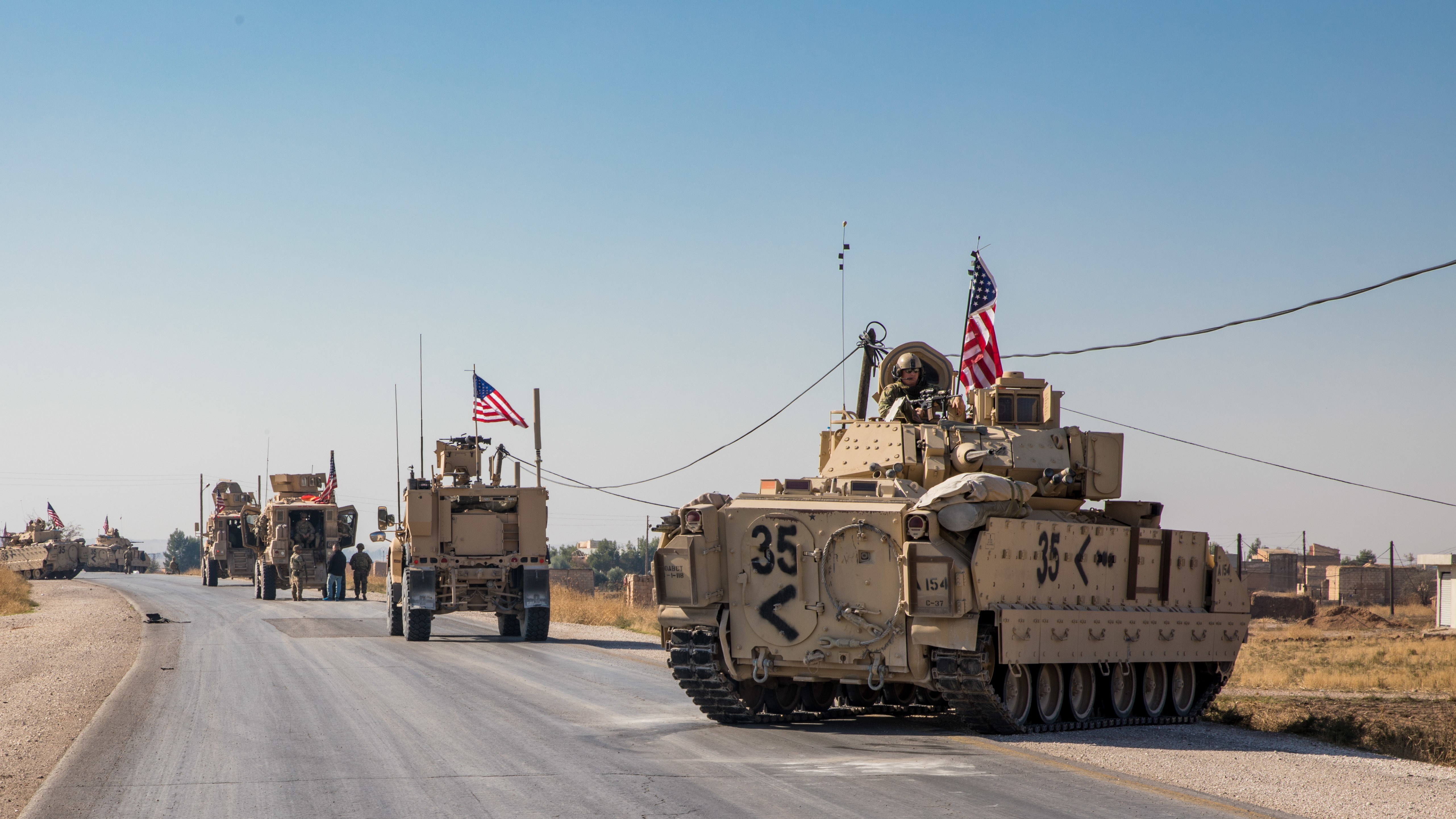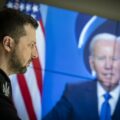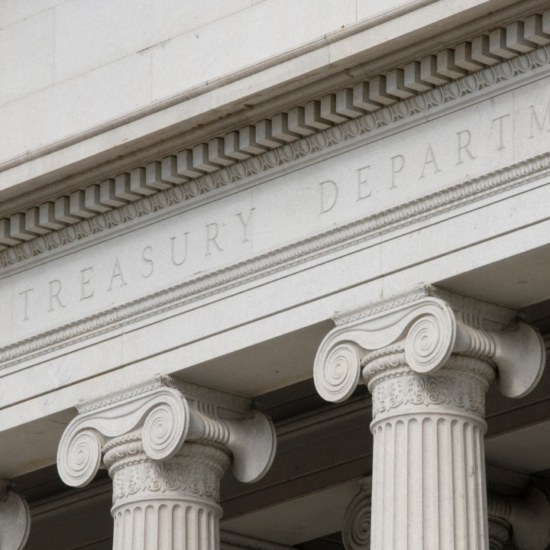
Image: Spc. DeAndre Pierce
Near the end of June 2021, the U.S. once more struck Iranian-allied targets in eastern Syria with missile strikes. Supposedly a preventative measure to deter further tit-for-tat attacks, such escalation has already invited retaliation against U.S. forces still controversially present in Syria. This latest development raises several fundamental questions: 1) Why is the U.S. military in Syria in the first place? 2) Why do periodic flare-ups there get such incoherent media coverage across the North Atlantic? 3) What prevents the North Atlantic foreign policy elites from reaching a consensus tack on the Syria question, especially as compared to other international conflicts? Pondering these questions, one fact becomes rather evident—Syria marks a clear watershed in the history of North Atlantic foreign policy, the final straw breaking more than two decades of tacit consensus of a national security establishment that had routinely championed U.S.-led liberal hegemony and rationalized foreign intervention.
Before Syria, there were, of course, earlier signals that the bubble of American-led liberal triumphalism was about to burst; and, today, serious observers no longer doubt the emergence of a multipolar age of great power politics replacing the unipolar system of American predominance that ensued in the aftermath of the Cold War. The immensely unpopular and ultimately disastrous U.S. invasion of Iraq is often cited as the beginning of the unraveling of the American moment and the foreign policy consensus of primacy and activism it incarnated.
Indeed, U.S. military interventions and occupations in Iraq and Afghanistan further alienated longtime rivals to U.S. hegemony and exacerbated contradictions in the Washington foreign policy establishment between primacists championing American unilateralism and those in the neoconservative and liberal internationalist camps who favored democracy promotion globally as a bulwark of the liberal international order. Those interventions not only destabilized the Middle East but turned out to be strategic failures.
Saddam’s removal empowered Iran, while a bogged down U.S. emboldened Russia—with Moscow reasserting itself in its former sphere of influence and militarily intervening in Georgia (2008) and Ukraine (2014). Moreover, with the American military campaigns costing U.S. taxpayers billions of dollars, the Great Recession of 2008 further ballooned the national debt and underscored for many the unsustainability of long-term American force projection and the importance of restraint. All these developments had the cumulative effect of accelerating the trend toward multipolarity and highlighting the need to recalibrate America’s role in the world (on the coattails of which Donald Trump ascended to the White House with his America First agenda). Yet, no event showcased the breakdown of the unipolar consensus and the emergence of a new status quo in North Atlantic foreign policy more than the tangled and ambivalent response of U.S. and its allies to the Syrian Civil War.
To gain insight into the uneven international response to the Syrian crisis, one must first consider the dynamics that led to the intervention in Libya. As the Arab Spring swept the Middle East in 2011, many NATO countries pushed for immediate intervention against the Libyan dictator Muammar Ghaddafi. Although Russia and China remained opposed to intervention in the Libyan Civil War, they did not veto military action at the U.N. Security Council. It is plausible that they offered up Libya as a grudging sacrifice in a quid-pro-quo to derail similar efforts toward international intervention in the then newly-unfolding Syrian Civil War. While facilitating Ghaddafi’s removal, NATO’s military campaign in Libya—led by Britain and France and supported by the U.S.—also led to systemic state failure and an acute humanitarian disaster, turning a country with one of the highest living standards in Africa into a warlord-riddled nest of jihadists and a haven for slave markets. The Libya campaign, which had been promoted in the Western press as a humanitarian emergency, in practice became a living testament of the calamitous consequences, in terms of the unraveling of the social and political order, foreign military operations could precipitate in the world’s most remote and troubled regions regardless of the good intentions.
Still, for all its failings, the Libyan case and the lead-up to it occurred against the backdrop of the old liberal order, the status quo ante that was established in the wake of the collapse of the Soviet Union. It thus portended little about the coming geopolitical shifts and the reshaping of the international system by the winds of multipolarity. The debates around Syria however, where Russia found itself able to resist the designs of other great powers, were a clear bellwether of that shift, inaugurating the new age of great power politics in which the U.S.-led bloc must balance its ambitions against those of a rising China and a more confident Russia actively challenging the North Atlantic’s global designs.
The Syrian crisis marked a turning point for the evolving international system because Syria was a nation that had never been a part of the Soviet Union nor a part of Russia’s traditional sphere of influence but Moscow’s strategic ally. Although defense ties between Moscow and Damascus were formalized back in the 1970s based on which Moscow established a naval facility on the Syrian seaport of Tartus on the Mediterranean Sea, Syria had not historically hosted large contingents of Russian military forces on its soil. When the Syrian Civil War broke out, Russia and China voted against a UN Security Council condemnation against the Assad government’s alleged attacks on civilians; instead, Russia sought to stabilize the situation in Syria and broker a resolution to the domestic conflict in that country.
The same could not be said for the various rebel movements that splintered into armed militias as the originally civil protests failed to produce significant political reforms in Syria. In a matter of months, the domestic unrest in Syria that began with the Arab Spring escalated into a full-on proxy war between various competing interests that mirrored the greater geopolitical rifts in the Middle East. As the geopolitical rivals of the Assad government—Turkey, Saudi Arabia, Persian Gulf monarchies, and NATO—invested heavily into supporting the rebels, Assad’s allies—Iran, Russia, and Hezbollah—partnered the Syrian government in quelling the kaleidoscopic insurrection.
When the West did not get the international backing it wanted to legitimize military action against Assad à la Libya, it decided to unilaterally interfere in the internal affairs of Syria and raise the stakes for the Assad government through covert activities. Since 2011 and soon after the uprising began, the U.K has spent a minimum of £350 million through its Conflict, Security and Stability Fund (CSSF) on at least 13 projects to support the various opposition groups and promote regime change in Syria. The U.S., meanwhile, quietly established one of the most expensive initiatives in the history of the CIA to help topple the Syrian government in Operation Timber Sycamore, a training and equipment program meant to directly aid the rebels. Most of those supposedly “moderate” rebels would eventually leave what many in NATO considered acceptable factions and defect to extremist groups, taking their weapons and training with them—significantly empowering Salafi jihadist groups like the Al-Nusra Front (a rebranded Al Qaeda, now known as Hayat Tahrir al-Sham, which is the dominant faction in the one major remaining rebel stronghold of Idlib Province), and even ISIS. In 2015, to counter such destabilizing Western intervention and to suppress Islamic extremism in the region, Russian forces entered Syria on the explicit invitation of President Bashar Assad as a security partner. In other words, in contrast to the illegal actions of the U.S. and its allies in Syria, Moscow’s intervention in that nation was not a violation of Syrian sovereignty. Russian military presence there thus remains legitimate under international law.
In addition to highlighting the new contested international strategic landscape, the dynamics around the Syrian conflict were revelatory in two other major regards. The first being its geopolitical fallout. The conflict revealed the new strategic fault lines and emphasized the internal divisions within the NATO alliance, whose Cold War trappings and outdated strategic baggage appear increasingly unsuitable and ill-conceived in a dynamic, multipolar setting. Those splits became most pronounced in the fraught relationship between the Western bloc and Turkey, the second largest military contributor to the alliance, over the political future of post-Assad Syria. As a major power in West Asia fueled by revisionist regional ambition and neo-Ottoman indignation, Erdoğan’s Turkey had (and continues to have) its own designs on Syria, which it sees as a lost part of its empire and a tributary state in its expanding sphere of influence.
While the Western bloc persisted (at least rhetorically) with its illusions of effecting a democratic transition in Syria via the more “moderate” rebel factions, its different objective of a weakened, dependent Syria meant Ankara had little qualms about which faction it would support so long as it gained leverage in the country. For an alliance that had been ostensibly transformed in the wake of the 9/11 terrorist attacks to become a coalition against global Islamist terror (in reaction to which Article 5 was invoked in the first place), NATO would now find itself tied to offshoots of Al Qaeda in Idlib, Syria, in major part due to Turkish activity. While NATO’s own ill-informed intervention was also to blame, the rise of Islamic extremism in Syria was a hard pill to swallow for NATO leadership, not to say it reeked of hypocrisy. As such, the radicalization of the opposition into a Salafi movement in the Syrian Civil War as a result of Turkish intrusion not only created massive tensions within NATO, but as the then-Vice President Joe Biden implied in 2014, it turned the war into a lost cause for those liberal idealists seeking regime change and a democratic alternative to the Ba’athist system.
The second significant consequence of the Syria affair was that the interventionist activist foreign policy that had underwritten the liberal hegemonic project for more than twenty-five years had lost its public appeal in North Atlantic’s liberal democracies. In Western societies, Syria accentuated the failure of the public relations campaign of the liberal internationalists and their media allies to sway a clear majority of the people to their new cause as they had many times before. With the Syrian Civil War ongoing, the constant barrage of often misleading influence campaigns over the years only succeeded in turning Syria into a politically-fraught wedge issue – yet also deepening the rift between the national security establishment and the conscientious citizenry. Even when they seemed to lukewarmly support tactical airstrikes in Syria, ordinary people did not want to see boots on the ground and/or their nation mired in yet another quagmire in the Middle East.
In any case, with Iraq and Libya casting their ominous shadow, the narratives behind intervention lost credibility and the old Manichean tropes about ideals and values no longer passed muster: at last, the reflexive interventionism that the War on Terror had routinized was replaced by a newfound, healthy skepticism on the part of some politicians and the larger public toward military interventions and the foreign policy of empire and activism. In America, rejecting both neoconservative and neoliberal hawkishness, this emerging coalition was rather disposed to heeding the call of former U.S. president John Quincy Adams, who counseled the nation to not go “abroad in search of monsters to destroy,” but instead be “the champion and vindicator only of her own” people.
The Syrian Civil War and its running toll of human suffering is perhaps the greatest tragedy of the 21st century so far, and one that could have been avoided or at least better managed through more diplomacy, prudence, and statesmanship. There never was a convincing argument that a post-Assad Syria would not descend into sectarian warfare and total state collapse, especially when the same had already transpired in Libya, a country with less obvious religious and ethnic divisions than Syria. Yet, perhaps all hope is not lost—if the Syrian debacle is understood as the watershed event it was and a teachable moment for North Atlantic foreign policy blob to finally change its primacist tack and move on from failed policies of regime change and democracy promotion in distant lands and their pursuit through ever-expanding military action and punitive sanctions both of which may in fact radicalize local populations and empower extremist groups. If it does help break the cycle of overreach and hubris, then perhaps the Syrian crisis could be remembered not just for its colossal human toll but also as the tragedy that broke the proverbial camel’s back in North Atlantic foreign policy and helped us avoid such unnecessary wars and interventions in the future.
Dr. Christopher Mott is a Research Fellow at the Institute for Peace & Diplomacy.










